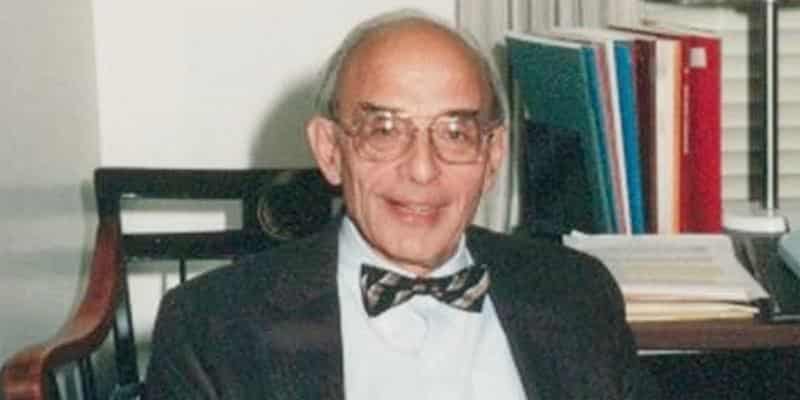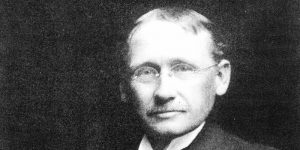Chris Argyris biography and books

Chris Argyris (1923-2013) was a Professor Emeritus at Harvard Business School. The work of Chris Argyris with respect to thinking about relationships of people and organizations, learning organizations and action research is known and recognized throughout the world.
Biography Chris Argyris
Chris Argyris was born in New Jersey on 16 July 1923 and grew up there. He obtained his first degree (MA) from Clark University in Worcester, Massachusetts in 1947.
There he came into contact with Kurt Lewin who had begun setting up the research center for group dynamics at the Massachusetts Institute of Technology (MIT).
He went on to obtain a Master’s degree (MSc.) in economics from Kansas University in 1949. And he received his doctorate (Ph.D.) in Organizational Behaviour from Cornell University in New York in 1951.
Argyris was supervised by William F. Whyte. He was a faculty member at Yale University in Connecticut from 1951 to 1971 and Chris Argyris served as a Professor of Administration Science and as Chairman of the faculty. He has been a Professor of Organizational Science at Harvard University since 1971.
His earlier research explored the impact of formal organizational structures, control systems and the management of individuals. The results of this earlier research can be found in two books namely Personality and Organization (1957) and Integrating the Individual and the Organization (1964).
The results from earlier research and responses to this caused Chris Argyris to shift his focus to organizational change and the exploration of the behaviour of individuals in general and that of top management in particular.
This was remarkable and it led to Chris Argyris developing most of his well-known intervention theories and methods. Donald Schön has made a major contribution with respect to the theoretical development of individual and organizational learning.
Chris Argyris and Donald Schön explored the concept of “learning systems” in depth as far as research and development are concerned. Both he and Donald Schön maintained certain ideas about the flexibility of people and organizations.
Life experiences and lessons learned in life should contribute to the development of people and organizations in times of change.
These ideas have been further developed in the theory of “Organizational learning”. Donald Schön and Agyris made their contributions to this by developing the theory of single loop learning and double loop learning and action research.
Chris Argyris also developed with Peter Senge the Ladder of Inference, a powerful Decision Making tool.
In addition to ground breaking research Argyris also gave many lectures. He is characterized as an influential teacher who inspires and enthuses students by providing them with practical exercises.
Famous quotes
- “Most people define learning too narrowly as mere ‘problem-solving’, so they focus on identifying and correcting errors in the external environment. Solving problems is important. But if learning is to persist, managers and employees must also look inward. The need to reflect critically on their own behaviour, identify the ways they often inadvertently contribute to the organisation’s problems, and then change how they act.”
- “Success in the marketplace increasingly depends on learning. Yet most people don’t know how to learn.”
- “Managers who are skilled communicators may also be good at covering up real problems.”
- “Smart people don’t learn… because they have too much invested in proving what they know and avoiding being seen as not knowing.”
- “In fact, people themselves are responsible for making the status quo so resistant to change. We are trapped by our own behavior.”
Publications, books and journals by Chris Argyris et al.
- 2012. Organizational Traps: Leadership, Culture, Organizational Design. Oxford University Press.
- 2008. Teaching Smart People How to Learn. Harvard Business Review Press.
- 2004. Reasons and Rationalizations: The Limits to Organizational Knowledge. Oxford University Press.
- 1999. Flawed Advice and the Management Trap: How Managers Can Know When They’re Getting Good Advice and When They’re Not. Oxford University Press.
- 1999, 1993. On Organizational Learning, 2nd ed. Blackwell Business.
- 1996. Organizational learning II: Theory, method and practice. Addison Wesley.
- 1993. Knowledge for Action: a Guide to Overcoming Barriers to Organizational Change. Jossey-Bass.
- 1990. Overcoming Organizational Defenses: Facilitating Organizational Learning. Allyn and Bacon.
- 1985. Action Science: Concepts, Methods, and Skills for Research and Intervention. Jossey-Bass.
- 1982. Reasoning, Learning, and Action: Individual and Organizational. Jossey-Bass.
- 1980. Inner Contradictions of Rigorous Research. Academic Press.
- 1978. Organizational learning: A theory of action perspective. Addison-Wesley.
- 1978. Regulating Business: the Search for an Optimum. Institute for Contemporary Studies.
- 1976. Increasing Leadership Effectiveness. Wiley.
- 1974. Theory in practice: Increasing professional effectiveness. Jossey-Bass.
- 1974. Behind the Front Page: Organizational Self-Renewal in a Metropolitan Newspaper. Jossey-Bass.
- 1972. The Applicability of Organizational Sociology. Cambridge University Press.
- 1971. Management and Organizational Development: the Path from XA to YB. McGraw-Hill.
- 1970. Intervention Theory and Method: a Behavioral Science View. Addison-Wesley.
- 1965. Organization and Innovation. R.D. Irwin.
- 1964. Integrating the Individual and the Organization. Wiley.
- 1962. Interpersonal Competence and Organizational Effectiveness. Dorsey Press.
- 1957. Personality and Organization: the Conflict between System and the Individual. Harper.
How to cite this article:
Van Vliet, V. (2010). Chris Argyris. Retrieved [insert date] from ToolsHero: https://www.toolshero.com/toolsheroes/chris-argyris/
Published on: 03/02/2010 | Last update: 04/14/2022
Add a link to this page on your website:
<a href=”https://www.toolshero.com/toolsheroes/chris-argyris/”>ToolsHero.com: Chris Argyris</a>











